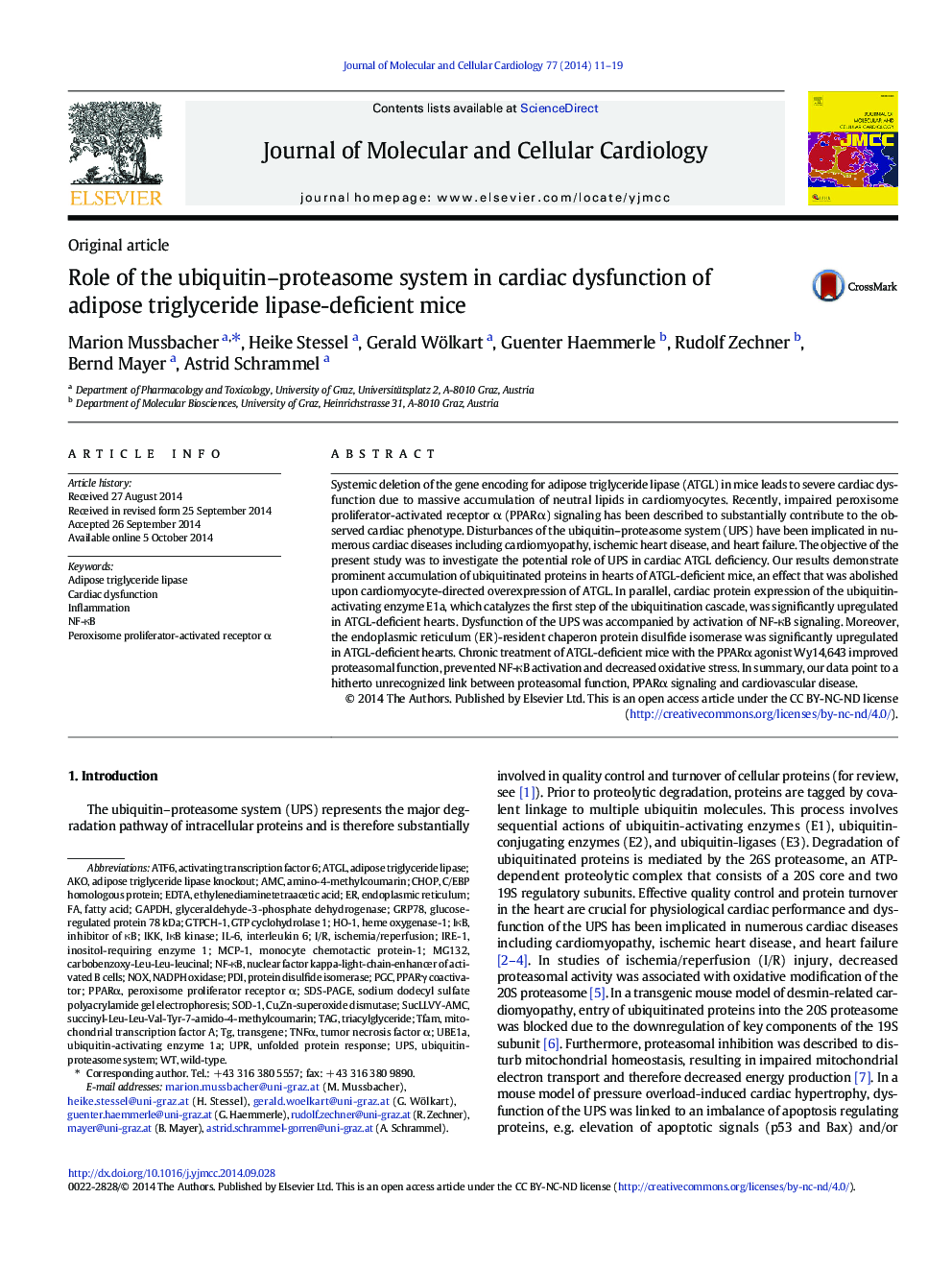| Article ID | Journal | Published Year | Pages | File Type |
|---|---|---|---|---|
| 8474544 | Journal of Molecular and Cellular Cardiology | 2014 | 9 Pages |
Abstract
Systemic deletion of the gene encoding for adipose triglyceride lipase (ATGL) in mice leads to severe cardiac dysfunction due to massive accumulation of neutral lipids in cardiomyocytes. Recently, impaired peroxisome proliferator-activated receptor α (PPARα) signaling has been described to substantially contribute to the observed cardiac phenotype. Disturbances of the ubiquitin-proteasome system (UPS) have been implicated in numerous cardiac diseases including cardiomyopathy, ischemic heart disease, and heart failure. The objective of the present study was to investigate the potential role of UPS in cardiac ATGL deficiency. Our results demonstrate prominent accumulation of ubiquitinated proteins in hearts of ATGL-deficient mice, an effect that was abolished upon cardiomyocyte-directed overexpression of ATGL. In parallel, cardiac protein expression of the ubiquitin-activating enzyme E1a, which catalyzes the first step of the ubiquitination cascade, was significantly upregulated in ATGL-deficient hearts. Dysfunction of the UPS was accompanied by activation of NF-κB signaling. Moreover, the endoplasmic reticulum (ER)-resident chaperon protein disulfide isomerase was significantly upregulated in ATGL-deficient hearts. Chronic treatment of ATGL-deficient mice with the PPARα agonist Wy14,643 improved proteasomal function, prevented NF-κB activation and decreased oxidative stress. In summary, our data point to a hitherto unrecognized link between proteasomal function, PPARα signaling and cardiovascular disease.
Keywords
GRP78MCP-1AmCPPARαIκBUPRATF6IKKTFAMHeme oxygenase-1NF-κBAKOMG132PGCGTP cyclohydrolase 1SOD-1IRE-1glucose-regulated protein 78 kDaPPARγ coactivatorPDITNFαIL-6GAPDHHO-1C/EBP homologous proteinCu,Zn-superoxide dismutaseI/RIκB kinaseNOxinositol-requiring enzyme 1AtglEDTAEthylenediaminetetraacetic acidCardiac dysfunctionFatty acidinflammationSDS-PAGESodium dodecyl sulfate polyacrylamide gel electrophoresisNADPH oxidaseischemia/reperfusioninterleukin 6transgeneTriacylglycerideTAG یا triacylglycerols tumor necrosis factor αCHOPUbiquitin-proteasome systemendoplasmic reticulummitochondrial transcription factor Anuclear factor kappa-light-chain-enhancer of activated B cellsactivating transcription factor 6adipose triglyceride lipaseinhibitor of κBwild-typeUnfolded protein responseMonocyte chemotactic protein-1protein disulfide isomeraseglyceraldehyde-3-phosphate dehydrogenaseperoxisome proliferator-activated receptor αUPS
Related Topics
Life Sciences
Biochemistry, Genetics and Molecular Biology
Cell Biology
Authors
Marion Mussbacher, Heike Stessel, Gerald Wölkart, Guenter Haemmerle, Rudolf Zechner, Bernd Mayer, Astrid Schrammel,
